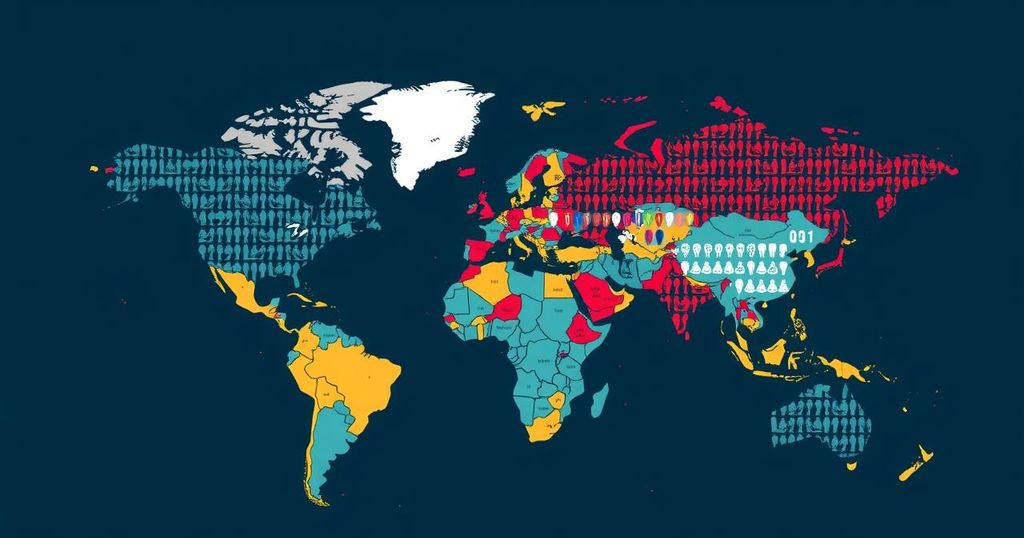The 2024 elections involved over 1.6 billion citizens, revealing a troubling disconnect between politicians and the populace. Gender representation is particularly lacking, with women holding less than 30% of parliamentary seats worldwide. Notably, Chile’s constitutional convention showcased potential for gender parity. Protecting democracy requires ongoing citizen engagement beyond elections, ensuring that future generations understand their crucial role in shaping an inclusive political landscape.
The year 2024 stands as a pivotal moment in electoral history, with over 1.6 billion individuals participating in elections across more than 70 nations. Despite this significant engagement, there is a prevailing sense that democracy faces unprecedented threats. This alarming disconnect between leaders and citizens is especially pronounced among younger generations, who grapple with pressing issues such as climate change, economic instability, and social inequity. The erosion of democratic ideals has led to escalating distrust in governmental institutions, raising critical questions regarding the representativeness of democratic systems.
A particularly glaring aspect of this disconnect is gender representation in governance. Currently, women occupy less than 30% of parliamentary seats globally, and fewer than 30 countries are led by women. Although there is slight progress, this pace indicates a troubling trajectory, suggesting that gender parity in governance will take approximately 130 years to achieve. Analogously, a plastic bag takes around 100 years to decompose, signifying the extent of this disparity and the stark question it raises: how can a system of representation fail to encompass half of its population?
To rectify this, it is crucial that political institutions mirror the demographics they intend to serve. An exemplary step forward was observed in Chile’s 2022 constitutional convention, which included equal representation of men and women among delegates. This significant milestone established Chile as a global beacon for gender equality in governance, demonstrating that a more inclusive democracy is attainable. Although the proposed constitution was ultimately rejected, the process highlighted the necessity for ongoing democratic dialogue that transcends mere electoral participation.
Collectively, we bear the responsibility to impart to succeeding generations an understanding of the transformative power they possess in shaping the future. Public officials must vigorously uphold their duties within democratic institutions, while citizens should acknowledge their role as stewards of democracy. It is imperative to convey that the essence of democracy extends well beyond periodic voting; it demands continuous engagement and activism.
Despite the myriad challenges that persist within democratic frameworks, one must acknowledge the advancements and tranquility that democracy has fostered throughout history. Though it is common to dissent over electoral outcomes, respect for the democratic process is paramount. Educating youth on the merits of democratic systems, particularly in uncertain times, is crucial.
Efforts by initiatives such as the Global Democracy Coalition’s “Thank You Democracy” are vital in ensuring that the milestones achieved through democratic governance, including universal female suffrage and marriage equality, remain at the forefront of public consciousness. Protecting democracy is essential, as it constitutes one of society’s most cherished institutions that merits fair treatment and safeguarding.
Upon reflecting on this election year, one derives varied sentiments of hope and disappointment. I personally emerge from this year reaffirmed in the belief that immediate action is required to cultivate a democracy that prioritizes citizen engagement. It is imperative that the voices of the populace are re-centered within democratic discourse.
In 2024, a historic electoral year unfolded, engaging a vast number of individuals in democratic processes worldwide. However, this heightened participation coincided with a growing anxiety surrounding the efficacy of democratic institutions. The increasing estrangement of citizens from their leaders has prompted concerns about the representativeness of current political systems, especially in relation to gender equality. The challenges faced by younger generations due to climate issues, economic hardships, and social injustices have exacerbated disenchantment with democratic ideals, highlighting an urgent need for change.
The historical elections of 2024 underscore the pressing need for democratic systems to genuinely reflect the populace they serve, particularly regarding gender representation. As we navigate growing distrust in political institutions, it is essential to recognize the collective responsibility of leaders and citizens to foster an inclusive democracy. By emphasizing engagement beyond voting and acknowledging the transformative power of citizen involvement, it is possible to rekindle hope in democratic governance. The imperative for a re-centered democracy that prioritizes citizen voices remains paramount.
Original Source: www.theguardian.com






